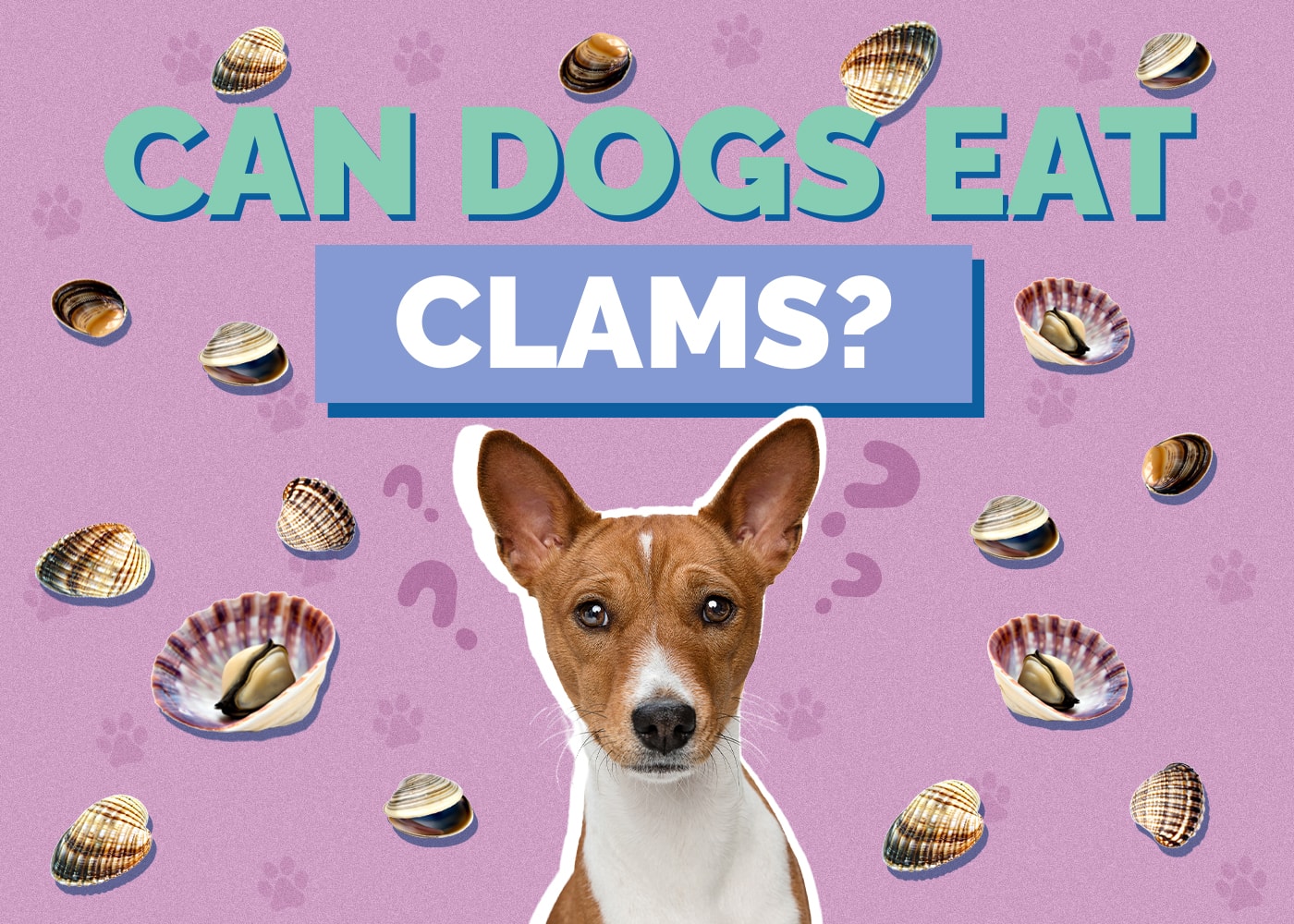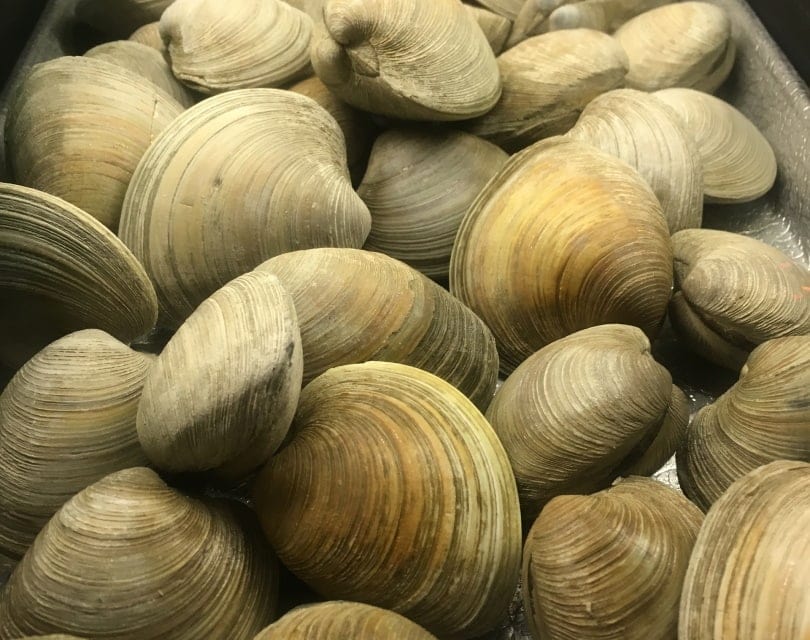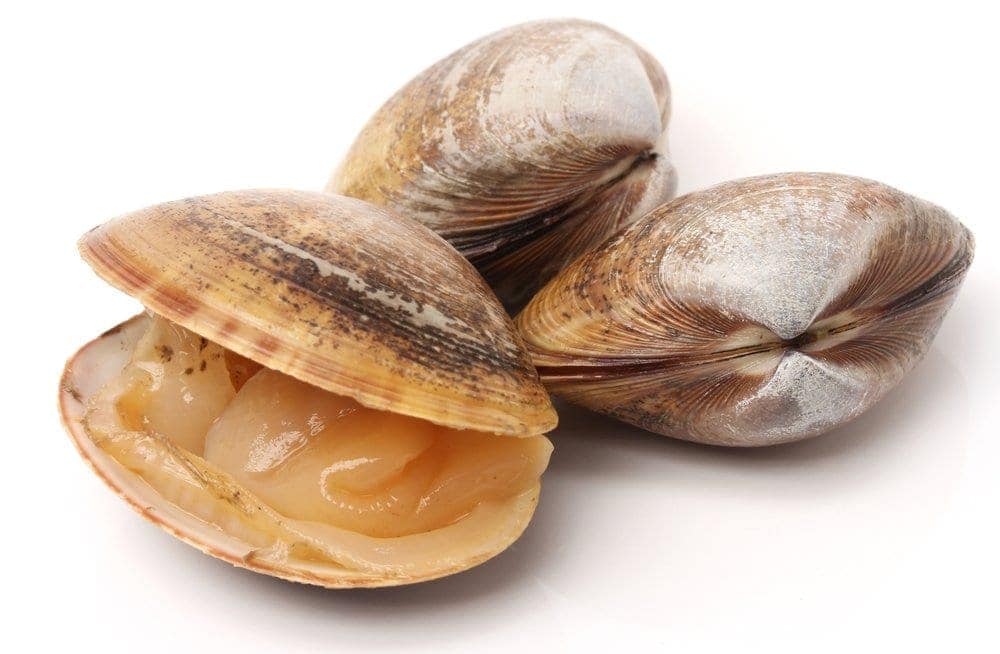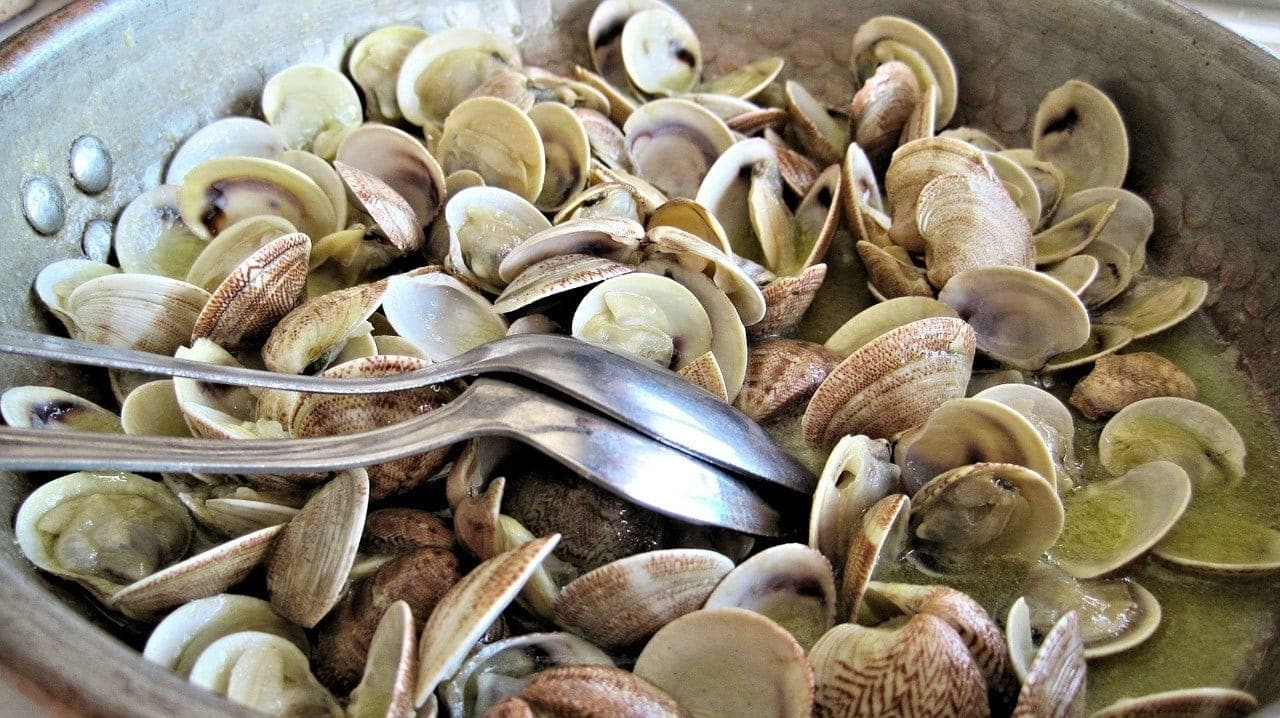Can Dogs Eat Clams? Facts & Safety Guide (Vet Answer)
Updated on

Click to Skip Ahead
Can your dog eat clams? The short and simple answer is yes, they can, in very small amounts, if cooked and prepared adequately. However, there are several important factors to take into consideration before giving your dog any type of shellfish. While clams and other shellfish may have great benefits, their intake should be kept to a minimum and they should never be offered raw.
Like humans, your dog may be allergic to shellfish, so you should take extra caution at first, whenever introducing a new source of food. Also, do not assume something is safe for your dog just because you can eat it. Their bodies and metabolism are different from ours.
Shellfish, including clams, are one of the most nutrient-dense foods in the world. Of course, clams can benefit some dogs as an occasional snack. Let’s take a deeper look into the risks and benefits of clams, to help you decide if they are worth being added to your pooch’s treat list.
What Exactly Are Clams?
Most people are familiar with common shellfish favorites like mussels and oysters, but clams are a slightly rarer dish. Clams can be found in both fresh and saltwater. True clams are bivalves, belonging to mollusks, with equal shells closed by muscles at opposite ends of the shell. They use a powerful, muscular foot to burrow beneath the surface of the water to depths of about 0.6 meters (2 feet).1
There are thousands of different species of clam that vary widely in size. Clams have basic internal organs and simple digestive and circulatory systems. People enjoy eating clams raw, as well as cooked, and they have a rubbery texture and somewhat fishy flavor. However, your dog should never be offered any raw shellfish. As we mentioned before, dogs cannot eat the same foods as we can, and they cannot eat raw shellfish. Even you can get very ill from eating raw clams.
Clams and bivalves in general are thought to be one of the longest-living animals; the oldest documented clam in the world was believed to be around 507 years old. The clam was still alive when found but suffered an ironic death when researchers tried to deduce its age.2

Health Benefits of Clams
As most dog owners are aware, your pooch wants to eat whatever it is you are eating, and they will often give you a convincing look that can easily coerce you into sharing. When it comes to cooked clam meat, sharing a few bites shouldn’t pose any problems but should be kept to a minimum — ideally not more than one clam. Clams do have great health benefits, though, and as the occasional treat offered in moderation, they can be given to your pooch.
However, keep in mind that the nutritional value of a single clam is not sufficient to actually provide your pooch with a significant amount of nutrients. A balanced and complete diet formulated by the Association of American Feed Control Officials (AAFCO) guidelines is all your dog needs in terms of beneficial vitamins and minerals. Everything else is just a fun and healthy snack, rather than something nutritionally significant. Some of the health benefits of shellfish have been established in humans, and these have been extrapolated to dogs, but real evidence of its safety and application in our canine companions is currently lacking.
- Vitamin B12. Clams are rich in vitamin B12, which is crucial for the nervous system and brain function to operate optimally, as well as the formation of red blood cells and DNA molecules. B12 is almost exclusively obtained from dietary sources, and clams are one of the most abundant sources on the planet.
- Iron is the second most concentrated nutrient found in clams, behind B12. Iron is involved in the synthesis of hemoglobin in the red blood cells and aids the transport of oxygen and nutrients throughout the body.
- Clams are a great source of lean proteins and essential amino acids. Some of the non-essential amino acids that are present in the highest percentage in some river clams include glutamic acid, alanine, and glycine.
- Vitamin C. Clams have moderate amounts of vitamin C and are one of the rare animal sources of this vitamin, which is a very important antioxidant. However, dogs can synthesize their own vitamin C, so supplementation is not required in most cases. It is important for collagen formation and skin and hair health, while also repairing and maintaining teeth, bones, and cartilage, and aiding in strengthening the immune system.
- Essential fatty acids. Clams contain omega-3 fatty acids and polyunsaturated fat, which help reduce inflammation, while also having many presumed benefits, like reducing signs of skin conditions and allergies, improving kidney and cognitive function, alleviating arthritis, and more. However, most of these still remain unproven by science, especially when it comes to dogs. There may be some benefit for dogs with arthritis as some studies suggest, but excess of omega-3 may also lead to adverse effects in some dogs.

Clam Health Concerns
While a small amount of thoroughly cooked clam meat is generally considered safe as an occasional treat for most dogs, there are a few concerns to be aware of.
- Stomach upset. Some dogs may develop vomiting and diarrhea when being fed unusual food sources like shellfish meat, and this may require veterinary attention.
- Paralytic shellfish poisoning. Clams are part of the family of bivalve mollusks that filter the water that they live in. The toxins they filter end up inside the clam’s tissue, and you or your dog may end up ingesting some of these toxins. This poisoning comes largely from toxins that build up due to algal blooms of dinoflagellates, usually during warmer months, which are unfortunately not destroyed by cooking. The toxin can persist in the clam tissues for months or longer, accumulating in the siphon, neck, gills, and some of the internal organs, which should be removed before cooking. If you cook it first, the toxins may contaminate the cooking liquid as well. This illness is exceedingly rare, though, as long as the clams are from a reputable source.
- Allergies. While it is rare, dogs could have allergic reactions to shellfish. Shellfish allergies are fairly common in humans, but most come from seafood sources like shrimp and crab. Allergies to shellfish in dogs are fairly unknown, as this is not a common food source for them. Consult with your vet before adding new ingredients or treats to your dog’s diet.
- Heavy Metals. It’s also very rare but still possible that the clams you give your dog may contain heavy metals, like mercury. Clams sourced from Asian waters have been found to contain heavy metals like cadmium and lead, which are harmful to your pooch in large amounts or with continuous chronic exposure.
It goes without saying that while it may be safe for most dogs to eat a small amount of cooked clam meat every once in a while, the shells are out of bounds. They can get stuck in your dog’s throat, esophagus, and digestive tract and potentially cause serious harm. Your dog can fracture a tooth trying to break them. We recommend giving your dog only small amounts of meat and not regularly.
Preparing Clams
So, we’ve seen that clams may be safe for your dog, but the question remains: Will they even eat them? Of course, this is largely dependent on preparation. Clams have a rubbery texture that some dogs may love to chew on but that other dogs may hate. Speak to your vet about offering clam meat as a treat to your dog.
Firstly, the clams should be cleaned thoroughly and free from any fragments of the shell. Remove the siphon, neck, and gills to minimize the risk of paralytic shellfish poisoning. The clams should ideally be cooked well, to avoid any contamination. Once they are cooked, they can be simply mixed into your dog’s regular food or offered as a very small treat. We recommend no more than one small-sized clam for an average dog. If your pooch won’t eat them, try mashing them into the food to conceal the texture, or consider other safe treat options.

Final Thoughts
With the right precautions, including preparing the meat properly and being aware of some of the risks associated with shellfish, cooked clam meat is generally considered safe for most dogs to eat. It contains a host of nutritional ingredients, such as B vitamins, mainly B12, omega-3 fatty acids, iron, lean protein, and vitamin C. However, remember that these amounts are not really sufficient to be a relevant source of nutrients for your dog and should not be seen as such. This is rather just a small occasional treat.
There are a few health risks associated with giving even thoroughly cooked clam meat to your dog, but these can be largely avoided by getting them from a good source and not feeding your dog too much. First speak to your vet to see if this is safe for your dog, depending on their age, medical history, and health status.
In conclusion, yes, most dogs can eat cooked clam meat, offered sparingly and occasionally, but these treats are not a replacement for a healthy and balanced diet.
Related Reads:
Featured Image Credit: Needpix













